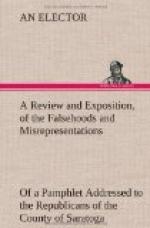In this the Spanish King failed. Philip II had died in 1598, too immersed in religious trials to see that the centre of his griefs was pivoted on the possession of Ireland by the female Nero. With his son and successor communication was maintained and in a letter of Philip III to O’Neill, dated from Madrid, Dec. 24th, 1599, we read: “Noble and well beloved I have already written a joint letter to you and your relative O’Donnell, in which I replied to a letter of both of you. By this, which I now write to you personally I wish to let you know my good will towards you, and I mean to prove it, not only by word, but by deed.” That promise was not fulfilled, or so inadequately fulfilled that the help, when it came, was insufficient to meet the needs of the case.
History tells us what the sad consequences were to the cause of civilisation in Ireland, from the failure of the Spanish King to realize the greatness of his responsibilities. But the evil struck deeper than to Ireland alone. Europe lost more than her historians have yet realised from the weakness of purpose that let Ireland go down transfixed by the sword of Elizabeth.
Had the fate of Europe been then controlled by a Hohenzollern, instead of by a Spanish Hapsburg, how different might have been the future of the world!
Although Europe had forgotten Ireland, Ireland had never forgotten Europe. Natural outpost and sentinel of that continent in the West for three-hundred years now gagged and bound, since the flight to Rome of her last native Princes, she stands to-day as in the days of Philip III, if an outcast from European civilization non the less rejecting the insular tradition of England, as she has rejected her insular Church. And now once more in her career she turns to the greatest of European Sovereigns, to win his eyes to the oldest, and certainly the most faithful of European peoples. Ireland already has given and owes much to Germany.
In the dark ages intercourse between the Celtic people of the West and the Rhinelands and Bavaria was close and long sustained. Irish monasteries flourished in the heart of Germany, and German architecture gave its note possibly to some of the fairest cathedral churches in Ireland.
Clonfert and Cashel are, perhaps amongst the most conspicuous examples of the influence of that old-time intercourse with Germany. To-day, when little of her past remains to venerate, her ancient language on what seemed its bed of death owes much of its present day revival to German scholarship and culture. Probably the foremost Gaelic scholar of the day is the occupant of the Chair of Celtic at Berlin University, and Ireland recognises with a gratitude she is not easily able to express, all that her ancient literature owes to the genius and loving intellect of Dr. Kuno Meyer.
The name of Ireland may be known on the Bourses or in the Chancelleries of Europe; it is not without interest, even fame, in the centres of German academical culture. But that the German State may also be interested in the political fate of Ireland is believed by the present writer.




